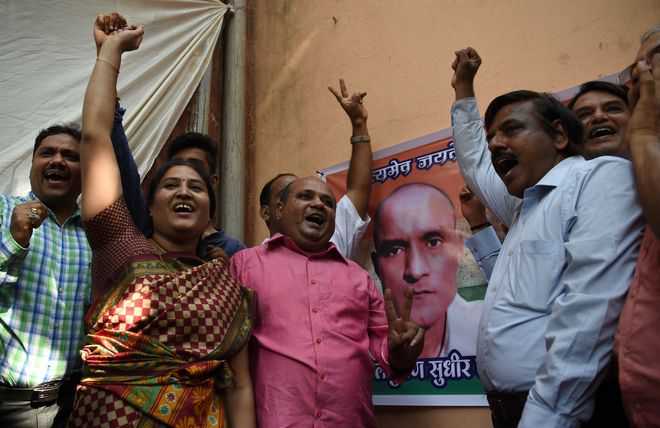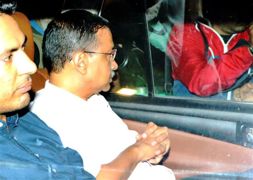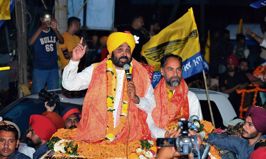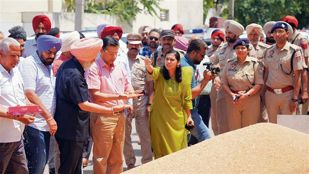
Kulbhushan Jadhav’s friends celebrate after the ICJ’s stay order on execution, in Mumbai on Thursday. PTI
Tribune News Service
New Delhi, May 18
The diplomatic community is upbeat over the stay order passed by the International Court of Justice (ICJ) in the Kulbhushan Jadhav case. The future course of action for both India and Pakistan will, in the next few days, depend on whether Pakistan decides to comply with the stay order or not. Most in the diplomatic community expressed the hope that Pakistan would act as a responsible member of the international order and accept the court’s directions.
Senior diplomat Veena Sikri, who served as India’s High Commissioner to Bangladesh, termed the ICJ stay was a “tremendous victory” for India. The order also validated the decision taken by PM Narendra Modi and External Affairs Minister Sushma Swaraj to approach the ICJ on the issue, Sikri added. “There were apprehensions whether we should go to the ICJ or not,” she said.
Besides being all praise for the government’s decision, she also praised Harish Salve for putting forward India’s stand effectively and highlighting how Pakistan violated the Vienna Convention. Sikri said if Pakistan refused to accept the court’s directions, it would be a blow to the credibility of Pakistan’s image globally.
Ambassador Ashok Sajjanhar, who served in Tehran and Geneva among other postings, said the ICJ decision was a “decisive and comprehensive” adding that “each and every issue raised by India has been vindicated and the stay is completely and decisively in India’s favour.” When asked what if Pakistan refused to comply with the Court directives, he said, “We need to proactively tell the international community that it has ramifications beyond the bilateral dimensions.”
BS Prakash, who served as India’s envoy to Brazil and at Indian missions like Sri Lanka, said the ICJ dismissed Pakistan’s argument and made its jurisdiction clear. He said, “Though the ICJ orders were not enforceable, all members of the United Nations have respect for the basic tenets of the system.” He said, “It is very unlikely of Pakistan to be dismissive of the order.”
He pointed out that this is a judicial judgment and is hence more sanctified than a United Nations Security Council (UNSC) resolution. “The court’s decision today puts constraints on Pakistan’s actions,” he said.
Salve cites 3 previous rulings
India’s lead attorney Harish Salve cited three previous death penalty and Vienna Convention-related cases fought at the world court during the trial
Mexico vs US
In 2003, Mexico took the US to the ICJ over a dispute concerning alleged violations of Vienna Convention with respect to 54 Mexican nationals who were sentenced to death in the US. They requested the court to ensure US should not execute or set execution dates for any Mexican national before the court passed judgment. The ICJ ruled its jurisdiction lay only in establishing whether the US breached its obligations, of the Convention. However, the US SC held that the order of the ICJ was not binding unless Congress has enacted statutes implementing it or unless treaty itself is “self- executing”.
Germany vs US
German national Walter LaGrand and his brother Karl were arrested in US state of Arizona in 1982 on suspicion of armed robbery and murder. In 1999, Germany instituted proceedings against the US for allegedly failing to inform the duo of their right to consular access, guaranteed by the Vienna Convention. The appeal was filed on the eve of the brothers’ execution. However, Karl was executed before the case started and Germany demanded that the US compensate his family and halt Walter’s execution till proceedings were pending. In its verdict the following day, the ICJ asked US to ensure Walter was not executed during proceedings. He was executed in a gas chamber in Arizona after ruling.
Paraguay vs US
The third case was again filed against the US when Paraguay dragged America to the ICJ in 1998 alleging that the state of Virginia had violated Vienna Convention by failing to inform Angel Francisco Breard, a Paraguayan, of his right to contact the Paraguayan consulate for assistance after his arrest. The Hague had called on the US to “take all measures at its disposal” to prevent the execution of Breard, pending a final decision in the proceedings instituted by Paraguay. However, Breard was executed on April 14, five days after the verdict. Paraguay later withdrew the case. PTI



























